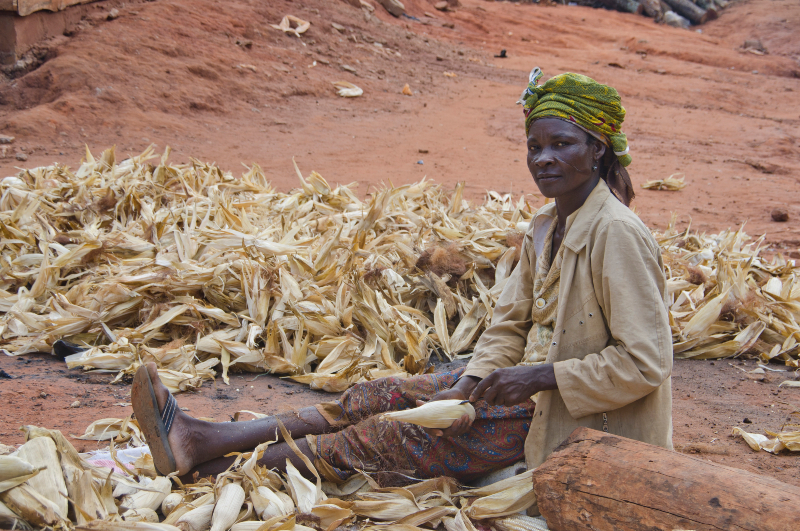

The 2007-08 global crises still evoke fresh memories on how price volatility can have debilitating effects on food security.
Volatility as rooted in economic theory bears the concept of variability and uncertainty. It is on these two concepts that price volatility is understood to denote a deviation from the normal price fluctuations in a competitive market functioning. Uncertainties in price movements have the tendency to generate price volatility since it is not known when normalcy returns. The uncertainty and variability in the world food price system in the 2007-08 crises were attributed to several factors, including increasing oil prices, demand for biofuels, and adverse policy responses such as bans on exports. Policy responses such as export restrictions had many ramifications on disrupting price signals and dampening supply by local producers.
Fast forward to 2022, the world is recovering from a global COVID-19 pandemic that has disrupted the global supply chain network, and farm products known for their bulk and perishability were more constrained in their geographical mobility. Furthermore, labor mobility during the pandemic has affected agricultural activities such as harvesting, processing, and transportation creating a ripple effect on the prices in food-importing countries. Sub-Saharan Africa (SSA) being a net food importer, this pandemic period has even affected the little gain in the region where some countries have ramped up local agricultural production to bridge the food deficit. When such supply chain networks are broken, a food crisis is expected as local producers may resort to price distortion and hoarding. Equally, as a net food importer, the price volatility in the international food market is transmitted to the domestic market thus impacting food access and affordability.
A new report by Eurasia Group and DevryBV Sustainable Strategies indicates that food insecurity will affect up to 1.9 billion people around the world by November 2022. Further, in the pre-pandemic and post-COVID-19 periods, the food situation in SSA has become direr due to several factors that have consequently impacted the food situation in the region. Firstly, weather shock has been a huge blow to the agricultural food commodities in the continent considering just 6 percent of arable land is on irrigation, exposing the region to yield variability. But the weather shocks are not limited to SSA as the world over, crop yields are likely to reduce. Such reductions in crop yields and loss of livestock attributed to harsh weather affect food availability and access, with the price spikes making food scarce to a large majority. Secondly, the exchange rates affect the prices of agricultural exports from the region as the exchange rates link the region to the world market. Thirdly, the ongoing Russia-Ukraine war presents another blow considering Russia and Ukraine's contribution to the wheat, maize, fertilizer, and oil markets. The sanctions on Russia and lagging agricultural production in Ukraine has negatively impacted the international market for these food products.
Apart from the rising food prices, the high inflation rates resulting from the war reverberate across the globe and have made food prices shoot for the highest. For example, the Kenya National Bureau of Statistics (KNBS) reported that the annual inflation accelerated to 7.9% in June 2022 from 7.1% in the previous month in Kenya, the highest level of Kenya’s inflation rate since August 2017. In Ghana, the weakened currency has made exports and incoming goods more expensive, causing the food prices to increase and driving those in poverty to spend more than they have. Protests have already been sparked by rising food prices in a number of nations across the globe, including Argentina, Indonesia, and Greece. After prices for necessities made from flour increased by as much as 300 percent, protesters in Iran took to the streets. Similarly, the energy crisis created through the sanctions on Russia has led to the high cost of domestic production of food commodities. Moreover, the growing energy demand in SSA is attracting increasing food crop use for biofuel production. Admittedly, both the high inflation and rising energy costs immensely affect low-income countries in SSA that spend much of their incomes on staples whose supply is currently undermined.
It is, therefore, clear from the factors contributing to price volatility that food crises emanate from the variability and uncertainty that may consequently attract policy responses with aggravating effects on food prices. Given that adverse policy measures such as export bans witnessed during the 2007-08 global crisis exacerbated the situation, protectionist measures such as trade restrictions may fail to exact needed corrective measures. Again, international trade may still reign in controlling food commodity price spikes to resolve the food crisis. Going by this price volatility, the International Monetary Fund (IMF) projects that the Ukraine war will further steepen food prices with a likely outcome of social unrest in SSA. Thus, the prevailing situations draw our attention to the role of regional and international integration as the best safety nets to buffer economies from deteriorating conditions. Government policy on biofuels can control how demand for biofuel feedstock affect food demand with emphasis on both the amount of food crops allocated for biofuel and the land allocated for biofuel feedstock production.
Related Articles
Select Payment Method
Pay by bank transfer
If you wish to make a donation by direct bank transfer please contact Fr Paul Hamill SJ treasurer@jesuits.africa. Fr Paul will get in touch with you about the best method of transfer for you and share account details with you. Donations can be one-off gifts or of any frequency; for example, you might wish to become a regular monthly donor of small amounts; that sort of reliable income can allow for very welcome forward planning in the development of the Society’s works in Africa and Madagascar.
Often it is easier to send a donation to an office within your own country and Fr Paul can advise on how that might be done. In some countries this kind of giving can also be recognised for tax relief and the necessary receipts will be issued.

